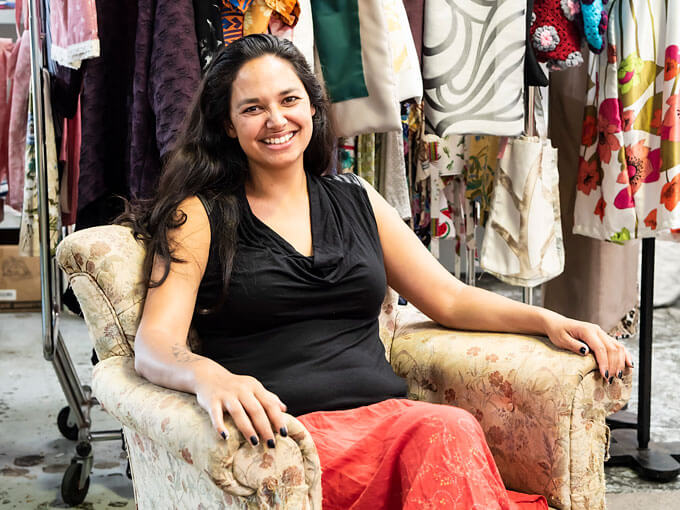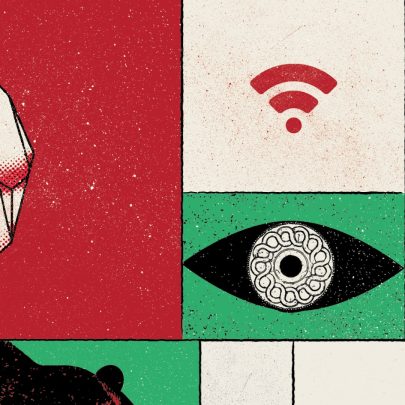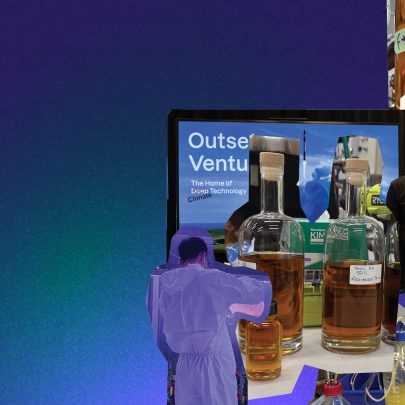Apr 23, 2019 Business
One man’s trash is supposedly another man’s treasure. And Tara Moala, the main brain behind waste minimisation enterprise Hub Zero, takes that saying very literally.
This story initially appeared on OurAuckland and is shared with permission.
Hub Zero’s office is almost entirely furnished with things other people have thrown away. There are discarded office chairs and furniture made out of old pallets. A pinboard set up for planning meetings is crafted from a former office desk divider. The table in its meeting room is made out of two recycled doors. On the floor, fabric offcuts are being sewn up and converted into beanbags. Even the cups in the kitchen are shared with another organisation.
For Tara Moala, the co-ordinator at Hub Zero, this headquarters in a converted warehouse behind a Panmure car yard is a glimpse of a possible future. Her mission is to see as many people as possible involved in redirecting so-called junk away from rubbish bins and landfills, and making it useful again in places like her office. It’s a process colloquially called “upcycling”.
Moala says there are big differences between the recycling process run by the council and what Hub Zero is trying to achieve. Recycled goods are generally “downcycled”, or turned into lesser quality goods, she says. Nice white lined paper might be turned into lower quality paper. Other materials could be ground down and used in construction. Some might just be deemed unsuitable for recycling altogether. At the end of its life, much of the material will be in the landfill or will end up as something that’s not great for the environment. “Some of it does get diverted into our roads and concrete, and they’re not exactly great.”
Hub Zero is trying to change that. It’s devoted to helping create and build up waste-based social enterprises and it offers space and instruction for creative people who want to reverse the direction of the traditional recycling process. It currently hosts two permanent tenants that are dedicated to helping people recraft discarded material – the Chinese Conservation Environmental Trust and the Multi Educational Support Services Trust – and it also offers hot desks. One of the benefits of this kind of upcycling is that materials stay out of the landfill for longer, Moala says. “We absolutely need both [recycling and upcycling],” she says. “But anything we have in our waste streams we should try to avoid sending it to landfill if possible.”
The scale of the challenge facing Hub Zero is huge. The materials the organisation is upcycling only represent a tiny percentage of the waste being diverted to landfills in Panmure alone. There needs to be a network of organisations across Auckland devoted to upcycling goods, Moala says. She’s starting to see part of that vision fulfilled, with shops for recycled materials being set up at transfer stations across the city, but more needs to be done, she says.
“It’s definitely a growth area. It’s already huge in other countries. There are malls overseas where all the shops have upcycled products. We could do that here, so you could go and every single thing you buy is upcycled.”
But even if upcycling goes mainstream, it won’t be enough on its own to truly turn back the tide of waste being shuttled to landfills, Moala says. She wants more government intervention to help deter the production of waste in the first place.
“We need actual law to get behind us. It’s going to be illegal to give out plastic bags soon. We need structural change like that. Penalties for people that produce unnecessary waste.”
For Moala, her urgency on the issue is personal. Though she has always been passionate about producing as little waste as possible, she decided to devote a big chunk of her life to the cause after she had children. Minimising the waste we produce is about giving them a decent world to inherit, and gifting them the same opportunities that older generations have enjoyed, she says.
“When the kids came it became so much more for me because if we keep screwing over our Earth, our kids are literally not going to have an Earth to use.”
This story was first published on Our Auckland.
Follow Metro on Twitter, Facebook, Instagram and sign up to the weekly email






